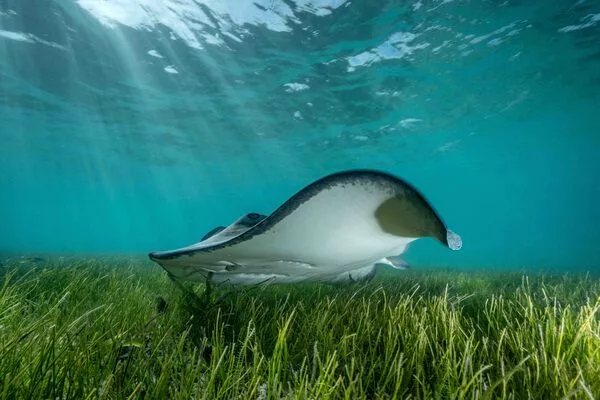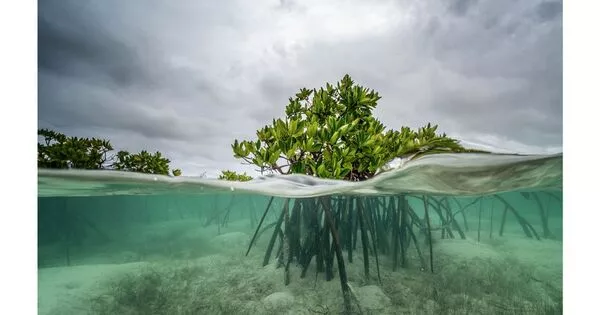Marine conservation can help mitigate climate change by protecting and restoring important ecosystems that play a critical role in carbon sequestration, oceanic and atmospheric processes, and the overall health of the planet.
Marine protected areas protect the oceans, seas, and estuaries. These zones aid in the preservation of the plants and animals that live in these waters, but the benefits of protected areas extend far beyond their borders. Researchers describe how marine protected areas aid in carbon sequestration and ecological and social adaptation to climate change.
Marine protected areas protect the oceans, seas, and estuaries. These zones aid in the preservation of the plants and animals that live in these waters, but the benefits of protected areas extend far beyond their borders. A team of researchers explains how marine protected areas help to sequester carbon and foster ecological and social adaptation to climate change in a review published in the journal One Earth.
Across all four pathways analyzed, only full and high levels of protection resulted in mitigation or adaptation benefits. In contrast, low levels of protection generated no benefits. Furthermore, increases in species richness and in fishers’ income only occurred for fully protected areas, where no fishing is allowed.
“Marine protected areas are becoming more popular as an ocean-based climate solution. Nonetheless, such claims remain contentious due to the fragmented and poorly synthesized literature on the climate benefits of marine protected areas” Please contact the authors. “We conducted a systematic literature review of 22,403 publications spanning 241 marine protected areas to address this knowledge gap.”
The authors discovered that carbon sequestration increased significantly in marine protected areas with seagrass, mangroves, and areas where sediment was not trawled. “Both partial and complete degradation of mangroves and seagrass resulted in similar decreases in sequestered carbon, indicating that even low levels of human impact result in significant carbon emissions,” they write.
In addition to boosting carbon sequestration, preserved areas were more biodiverse, had increased species richness, and showed benefits for humans, too. Marine protected areas had greater food security, and fish stocks in waters adjacent to these protected areas swelled. The authors note that the mitigation and adaptation benefits of these protected areas were only achieved under high levels of protection, and that benefits increased the longer an area had been protected.

“Across all four pathways analyzed, only full and high levels of protection resulted in mitigation or adaptation benefits,” they write. “In contrast, low levels of protection generated no benefits. Furthermore, increases in species richness and in fishers’ income only occurred for fully protected areas, where no fishing is allowed.”
Here are some specific examples of how marine conservation can help mitigate climate change:
- Protecting coastal ecosystems: Coastal ecosystems such as mangroves, salt marshes, and seagrass beds can sequester large amounts of carbon, helping to reduce the amount of carbon dioxide in the atmosphere. By protecting and restoring these ecosystems, we can increase their carbon sequestration potential and reduce greenhouse gas emissions.
- Reducing greenhouse gas emissions from shipping: Shipping is a major source of greenhouse gas emissions, and marine conservation measures such as regulating shipping routes and speeds, and promoting the use of low-emission fuels can help reduce emissions from this sector.
- Promoting sustainable fishing practices: Sustainable fishing practices can help reduce the amount of carbon dioxide released into the atmosphere by reducing the amount of energy used in fishing, and by reducing the amount of carbon dioxide emitted from decomposing fish waste.
- Protecting and restoring marine ecosystems: Healthy marine ecosystems, such as coral reefs and kelp forests, can sequester carbon and help regulate the climate. Protecting and restoring these ecosystems can help maintain their carbon sequestration potential and prevent further damage to the environment.
- Promoting renewable energy: Marine conservation measures can also promote the development of renewable energy sources such as offshore wind and tidal energy, which can help reduce greenhouse gas emissions from fossil fuels.
In conclusion, evidence suggests that marine conservation can play a significant role in mitigating climate change by protecting and restoring important ecosystems, reducing greenhouse gas emissions, and promoting sustainable practices.





